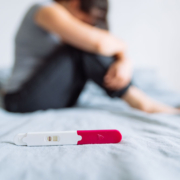Hormone Imbalance: What are the Symptoms and Treatments?
When you’re browsing social media or watching TV, you may have come across ads telling you to ask your doctor to “check your hormones” as the first step toward diagnosing and relieving a troublesome set of symptoms. It’s true that hormone imbalances can be associated with many problems, such as period problems, unwanted hair growth, fertility struggles, weight gain, and even difficulty sleeping. You should absolutely talk to your doctor about these things. But you may be surprised when your doctor tells you that they can’t just give you a “hormone check.”
A hormone check sounds simple—after all, we check cholesterol to get a handle on our heart health. However, your doctor can’t just give you a hormone test because a single test to check all your hormones doesn’t exist.
So if there isn’t a simple hormone test, how does your doctor discover hormone imbalances? And how can you learn what could be causing your symptoms?
Let’s look at problems caused by hormone imbalances and how your doctor could potentially determine which hormones may be responsible for your symptoms.
Reasons Your Doctor Can’t Give You a Hormone Imbalance Test
You may wonder why your doctor can’t give you a quick test to determine if all your hormones are in balance. Testing hormones is very different from testing cholesterol or iron in your blood because your hormone levels are always changing, day by day, even hour by hour. They change based on where you are in your menstrual cycle, when you last ate, what your other hormones are doing, how stressed you are, and many other factors. That’s why a single “hormone check” can’t really tell you if all your hormones are balanced.
Secondly, asking your doctor to “check your hormones” is a huge request. The human body produces more than 50 hormones! Hormones include melatonin (which regulates your sleep cycle) adrenaline (which prepares your body for “fight or flight”), oxytocin (the “feel good” hormone), cortisol (which helps your body respond to stress), and progesterone (which stimulates the growth of your uterine lining in the second half of your menstrual cycle), just to name a few.
The best way to discover if specific hormones are out of balance is by telling your doctor which symptoms you are experiencing so they can narrow down what should be checked and when. Your symptoms are your doctor’s first clues about what could be wrong.
Three Categories of Symptoms Often Caused by Hormonal Imbalances
When we see patients at Madison Women’s Health for hormonal imbalances, most of their symptoms and concerns fall into three categories:
- Periods and period-related symptoms;
- Fertility issues;
- Problems at the beginning and end of the reproductive cycle (puberty and menopause).
Let’s first discuss these groups of symptoms. Next, we’ll cover the most common hormones your doctor may check based on your symptoms.
1. Period Problems and Period-Related Symptoms Caused by Hormone Imbalances
A common complaint of women who visit Madison Women’s Health is irregular periods or unexpected changes to their periods. A period is considered irregular when it occurs more often than before or less often than before, or if the amount and duration of bleeding has changed significantly for repeated months. Is your period suddenly much heavier than it has been? Or are you not having a period at all?
Keep track of your cycles, when you begin to bleed, and for how long. A popular app among our patients for tracking cycles is Period Tracker Period Calendar (available on iOS and Android), although there are many options. Let your doctor know how many days there are between your periods and what your typical flow is like. Discuss what is different and why you are concerned. Let them know if you’re under more stress than before, if you’ve changed your diet or exercise recently, or if you have a family history of irregular periods.
These changes could have a structural cause — having to do with your cervix or uterus — or a hormonal cause. Your doctor will likely want to perform a physical exam and may also check specific hormones on a specific day of your menstrual cycle.
2. Fertility Problems Caused by Hormone Imbalances
Another common time women ask for a hormone checkup is when trying to conceive. Typically, 84% of women get pregnant after a year of unprotected sex. When conception doesn’t happen, one reason could be a hormonal imbalance. To learn more, read our extensive article about fertility challenges here.
Again, it’s important to track your menstrual cycle, including the dates you have unprotected sex, to give your doctor a picture of what your reproductive cycle is doing. Keep in mind that your partner should also be tested for structural or hormonal issues if you have been trying to conceive for some time.
If you’re having your period too often (every couple of weeks), then your uterus can’t sustain a fertilized egg. If your periods are too far apart (6 weeks and longer), your ovaries may not be releasing eggs often enough into your fallopian tubes.
3. Puberty & Menopause Problems Caused by Hormone Imbalances
Getting First Period too Young or too Old
Typically, a girl will begin her period at a similar age to when her mother began getting hers. Some girls have their first period as early as 10 or 11. Others don’t get their first period until they’re 15 or even 16. If you or your daughter are outside those age ranges and are concerned about that first period, it is worth a visit to her Pediatrician, Family Doctor or OBYGN.
Common factors that affect when a girl begins her period are weight changes, environmental factors that stimulate the hormones, or adrenal gland problems.
Irregular Periods in Teens
Pre-teens and teenagers have very irregular periods as their bodies mature. Sometimes, teens have unusual bleeding because they aren’t ovulating regularly. In this case, they have some hormonal development that isn’t complete so the uterus isn’t getting a clear enough signal of what to do.
Issues During Menopause
When women approach their mid- to late-40s, their cycles may become irregular as they enter the perimenopausal stage. You can read more about what to expect in perimenopause in our recent article. Signs that you may be experiencing perimenopause include skipping periods and having lighter periods.
If your periods are becoming heavier, more frequent, prolonged, or with spotting between periods, you should mention this to your doctor. These changes could indicate menopause, but they could also be caused by abnormalities in your cervix or uterus.
Common Hormone Imbalances Women Experience
With more than 50 hormones affecting all aspects of how your body functions, your period, your fertility, your energy, and your weight, we’re going to briefly touch on the most common disorders and imbalances we see at our OBYGN clinic.
Polycystic Ovarian Syndrome (PCOS)
PCOS affects between 5% and 10% of women of childbearing age. PCOS causes ovaries to produce higher levels of androgens (male-type hormones), which can cause anovulation—lack of egg release each month from your ovaries. Instead of releasing eggs, the ovaries of women with PCOS produce multiple small cysts that further contribute to a hormonal imbalance.
Symptoms of PCOS Include:
- Irregular periods caused by anovulation;
- More hair growth (hirsutism) on areas typically associated with males (like on the face, chin, chest, abdomen, arms);
- Acne, especially deeper, cystic acne that persists into adulthood;
- Weight gain and a harder time losing weight;
Women with PCOS often have greater challenges managing their blood sugar, which can turn into Type 2 diabetes if a healthy diet is not followed. In addition, women with PCOS are at risk for cardiovascular disease later in life, and so their cholesterol levels should be watched.
What is Tested When Diagnosing PCOS?
- Typical blood tests for PCOS to measure the levels of FSH (follicle stimulating hormone), LH (luteinizing hormone), testosterone, and adrenal gland hormones.
- An ultrasound to look for cysts on the ovaries.
Treatments for PCOS
There is not a cure for PCOS, but the symptoms caused by PCOS can be treated. A few ways to treat PCOS include:
- A healthy diet and exercise, which can help you lose weight and manage your blood sugar levels.
- Medications that help manage your blood sugar levels can be prescribed.
- Creams can be prescribed that help slow excess, male-pattern hair growth.
- Birth control options to help regulate your hormones, as suppression of ovarian hormone release can help control symptoms and regulate periods.
- Medications that can help your ovaries produce and release eggs, if pregnancy is your goal.
Thyroid Disorders
Hypothyroidism, when the thyroid produces too little hormone, can cause you to feel tired constantly and to gain weight. Hyperthyroidism, when the thyroid produces too much hormone, can result in weight loss and feeling like you have too much energy.
Whether you have too much thyroid hormone or too little, your period will be affected. It could become very light, could stop for several months, or could become very heavy and more painful than before. Many times, symptoms related to thyroid abnormalities are confused with menopausal symptoms. Read more about perimenopause here.
Problems with thyroid production could be caused by genetics, growths, or rarely thyroid cancer, but many times there is no other issue.
Symptoms of Thyroid Abnormalities Include:
- Changes in menstrual cycle;
- High heart rate and heart palpitations — more than 100 beats per minute. (Note: mention to your doctor if it is frequently over 80 beats per minute.)
- Lack of energy, exhaustion, or trouble sleeping;
- Unexplained anxiety or new depression symptoms;
- Weight loss and weight gain;
- Hot flashes or excess sweating;
- Chills, unable to feel warm, especially in your hands and feet;
- Hair loss not related to stress, recent pregnancy or age that leaves bald spots;
- Muscles that ache without cause, especially in the neck area;
- Feelings of “brain fog”;
- Changes to vision or appearance of the eyes;
- Swelling or growth on the neck.
What is Tested when Diagnosing Thyroid Disorders?
- TSH (thyroid stimulating hormone—the “thermostat” of the thyroid gland), T4, T3, and sometimes thyroid antibody tests.
- Please note that pregnancy, birth control pills, and a supplement called Biotin can affect some thyroid test results.
Treatments for Thyroid Disorders Include:
- Prescriptions to slow down thyroid hormone production;
- Prescriptions to replace thyroid hormones when the right amount isn’t being produced;
- Surgery to remove some or all of the thyroid gland.
Estrogen Imbalances
Ninety-five percent of women do not have a significant estrogen abnormality until they begin going through menopause.
However, women with very low body fat (such as elite athletes or women with eating disorders) may experience extremely light or non-existent periods (amenorrhea). Too much estrogen could cause periods to be extremely heavy and prolonged, and is sometimes caused by body fat levels being too high.
Symptoms of Too Low or Too High Estrogen Include:
- Irregular or absent periods because your body is not ovulating;
- Painful sex;
- Mood swings, worse PMS;
- Hot flashes;
- Breast tenderness;
- Increased headaches and migraines;
- Weight gain;
- Fatigue.
Treatments for Estrogen Imbalance
Your doctor may be able to provide some relief from these symptoms with a method of hormonal birth control. Lifestyle changes such as adjusting exercise levels and maintaining a healthy weight can also help.
Progesterone Imbalances
Progesterone is produced by the ovaries (mostly after ovulation each month), the adrenal glands, the placenta during pregnancy.
Symptoms of Too Low Progesterone Include:
- Irregular or absent period;
- Difficulty becoming or staying pregnant;
- Low sex drive;
- Depression;
- Some researchers believe that subtle changes in progesterone production after ovulation may contribute to increased PMS symptoms in some women
Treatments for Progesterone Imbalance Include:
- Birth control with progesterone-containing pills/ring/patch, a progesterone IUD (if you’re not trying to get pregnant)
- Progesterone tablets, capsules or suppositories to help while trying to conceive
- Over-the-counter progesterone creams: apply to skin in the second half of your menstrual cycle for mild pre-menstrual symptoms
Prolactin Imbalances
Prolactin is produced by your pituitary gland. One of the reasons your body could be producing too much prolactin is a prolactinoma, which is a noncancerous growth on the pituitary gland. Hyperprolactinemia (too much prolactin) can also be caused by anorexia, liver disease, and hypothyroidism.
Symptoms of Too Much Prolactin Include:
- Discharge from your nipples when you are not pregnant or breastfeeding, or feeling like your breasts are getting ready to let down milk;
- Headaches and sometimes visual changes;
- Irregular periods;
- Fertility problems.
Treatments for Too Much Prolactin Include:
- Evaluation of the pituitary gland with an MRI
- Medications that can control high prolactin levels;
- Surgery, if you have prolactinoma;
Risks of Not Treating Hormone Imbalances
Hormone imbalances, when left untreated, are more than just “annoying mood swings and bad PMS.” They can be indicators that something more serious — rarely, even cancerous — is happening in your body.
Not getting your hormones back in balance could lead to other problems, like elevated cholesterol, osteoporosis, obesity, lack of sleep, and more.
Although truly identified hormonal imbalances often need medical or even surgical intervention, a healthy lifestyle can improve low-level symptoms.
Do your best to get:
- 6-8 hours of sleep each day;
- 30+ minutes of vigorous exercise daily;
- And a high-quality diet with enough protein and healthy fats and less sugar.
Conclusion
You know better than anyone when your body is feeling “off.” Maybe you don’t have energy like you used to, you’re not sleeping well, and you’re feeling anxious and depressed for no apparent reason. Maybe you’re developing hair in unusual places and losing hair on your head. Maybe your weight is changing and you feel like you can’t control what it’s doing — whether that’s weight gain or weight loss. Or maybe your periods are getting worse (or going away entirely).
At Madison Women’s Health, we want to empower you with education to make healthy lifestyle choices and support you along the way. While there isn’t one big hormone test that can let you know if your hormones are balanced, we will listen to your symptoms, ask you questions, and determine together what can be done.
We always want you to feel welcome to discuss your symptoms with us so we can help you feel like yourself again!










